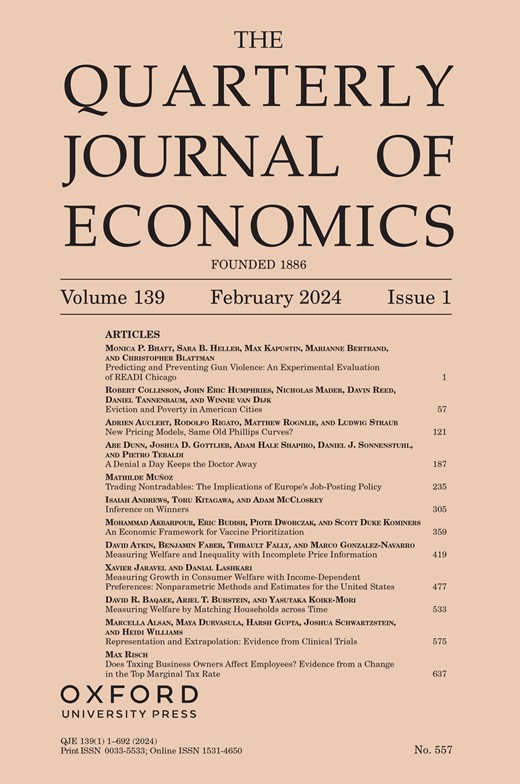Learning from Shared News: When Abundant Information Leads to Belief Polarization
IF 11.1
1区 经济学
Q1 ECONOMICS
引用次数: 3
Abstract
Abstract We study learning via shared news. Each period agents receive the same quantity and quality of firsthand information and can share it with friends. Some friends (possibly few) share selectively, generating heterogeneous news diets across agents. Agents are aware of selective sharing and update beliefs by Bayes’s rule. Contrary to standard learning results, we show that beliefs can diverge in this environment, leading to polarization. This requires that (i) agents hold misperceptions (even minor) about friends’ sharing and (ii) information quality is sufficiently low. Polarization can worsen when agents’ friend networks expand. When the quantity of firsthand information becomes large, agents can hold opposite extreme beliefs, resulting in severe polarization. We find that news aggregators can curb polarization caused by news sharing. Our results hold without media bias or fake news, so eliminating these is not sufficient to reduce polarization. When fake news is included, it can lead to polarization but only through misperceived selective sharing. We apply our theory to shed light on the polarization of public opinion about climate change in the United States.从分享的新闻中学习:当丰富的信息导致信仰两极分化
我们通过分享新闻来研究学习。每个时期的代理收到相同数量和质量的第一手信息,并可以与朋友分享。一些朋友(可能很少)有选择地分享,在代理之间产生异质的新闻饮食。根据贝叶斯规则,智能体意识到选择性共享和更新信念。与标准的学习结果相反,我们表明信念在这种环境中会发生分歧,导致两极分化。这需要(i)代理人对朋友的分享有误解(即使是轻微的误解),(ii)信息质量足够低。当代理人的朋友网络扩大时,两极分化会加剧。当第一手信息的数量变大时,代理人可能持有相反的极端信念,导致严重的两极分化。我们发现新闻聚合器可以抑制由新闻分享引起的两极分化。我们的结果在没有媒体偏见或假新闻的情况下成立,因此消除这些并不足以减少两极分化。当包含假新闻时,它可能导致两极分化,但只有通过错误的选择性分享。我们运用我们的理论来阐明美国关于气候变化的公众舆论的两极分化。
本文章由计算机程序翻译,如有差异,请以英文原文为准。
求助全文
约1分钟内获得全文
求助全文
来源期刊

Quarterly Journal of Economics
ECONOMICS-
CiteScore
24.20
自引率
2.20%
发文量
42
期刊介绍:
The Quarterly Journal of Economics stands as the oldest professional journal of economics in the English language. Published under the editorial guidance of Harvard University's Department of Economics, it comprehensively covers all aspects of the field. Esteemed by professional and academic economists as well as students worldwide, QJE holds unparalleled value in the economic discourse.
 求助内容:
求助内容: 应助结果提醒方式:
应助结果提醒方式:


